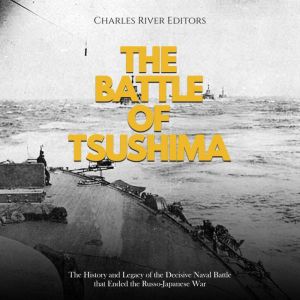

List: $6.95
| Sale: $4.87
Club: $3.47
The Battle of Tsushima: The History and Legacy of the Decisive Naval Battle that Ended the Russo-Japanese War
Author: Charles River Editors
Narrator: Colin Fluxman
Unabridged: 1 hr 31 min
Format: Digital Audiobook Download
Publisher: Charles River Editors
Published: 02/12/2022
Categories: Nonfiction, History, Russian History, Asian & Pacific Islander History
Synopsis
By the end of the 19th century, the Russian Empire seemed to be at the zenith of its power and reach. It was the largest country in the world, stretching from the Black Sea on the eastern edge of Europe to the Bering Straits in the extreme east of Asia. Even by rail, it took over ten days to travel from one side of the country to the other. Its standing army of over 1.3 million men was the largest in the world, and the “Russian Steamroller” was regarded as one of the most potent military forces available to any ruler. The sudden and unexpected rise of Japanese influence in the region was opposed by Russia, Germany, and France, who threatened war with Japan unless the terms that ended the war were changed. Reluctantly, the Japanese agreed to withdraw from Manchuria, but they never forgot or forgave what they saw as the way in which the unwarranted European influence was used against them. Japanese suspicions were reinforced when Russia subsequently concluded a treaty of alliance with China and forced the tottering regime to grant a lease of the Liaodong peninsula to Russia. Russian troops occupied Port Arthur and began to build massive fortifications around the city. The port was linked to Russia by a new railroad that connected to the Trans-Siberian Railroad at the Chinese city of Harbin. Russia also insisted on the right to use its troops to defend the new railroad throughout its length in China. Although the terms by which Russia leased the port from China were temporary, it was clear that Port Arthur was intended to become Russia’s new warm-water port on the Pacific. To most observers, it seemed clear that Japan and Russia were destined to come into conflict in Korea and Manchuria. Both empires were set on expansion, and both saw these areas as important. However, Russia’s vastly larger population, army, and navy seemed to make it inevitable that Japan would lose if the conflict escalated into war.